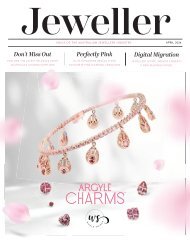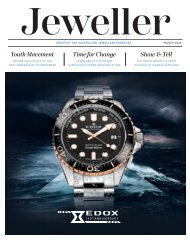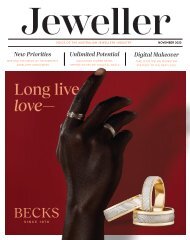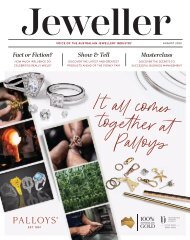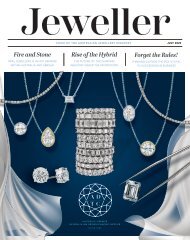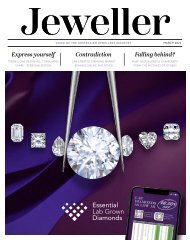Jeweller - July 2022
Door wide open: Lab-grown diamonds have a unique chance to thrive The Ego Game: Personalised jewellery is as popular as ever seen Avoid the trap: The business world is full of cliches - it's time to move on
Door wide open: Lab-grown diamonds have a unique chance to thrive
The Ego Game: Personalised jewellery is as popular as ever seen
Avoid the trap: The business world is full of cliches - it's time to move on
You also want an ePaper? Increase the reach of your titles
YUMPU automatically turns print PDFs into web optimized ePapers that Google loves.
Business Strategy<br />
forces in a global economy spell the end of<br />
vague buying and ranging.<br />
You must stand for something, or you will<br />
become a pushover in the retail market.<br />
We can move on from this cliché too; delete<br />
it from your thoughts!<br />
Retail is detail<br />
I support this expression, however,<br />
caution is needed.<br />
At one end of the scale, it’s often the<br />
small things that make all the difference,<br />
particularly in execution at the customerfacing<br />
side of the business.<br />
The other extreme is our counter cliché,<br />
‘analysis paralysis’.<br />
This is a trap people who value planning<br />
are often accused of falling into. It’s<br />
increasingly difficult to avoid with more<br />
data becoming accessible every day.<br />
To my mind, the key here is to select the<br />
appropriate level of detail for the task,<br />
and the specific outcome required.<br />
Retailers should ask themselves questions<br />
such as, what decisions need to be made?<br />
What are we solving for?<br />
Work back from that starting point to<br />
gauge the right level of detail and how<br />
much analysis is enough.<br />
Making decisions is easier when you<br />
understand that you’re not looking for the<br />
right answer, if there even is one, but the<br />
best possible answer given the information<br />
you have, under the circumstances.<br />
Lock this one in, but always carefully<br />
consider ‘retail is detail’.<br />
Right product, right place, right time<br />
This old saying is often associated with<br />
merchandise planning specifically.<br />
I’m a fan of achieving these ‘right’ results<br />
using the right stock, in the right place, at<br />
the right time.<br />
I just think there is work to do in how these<br />
results are achieved.<br />
If retailers keep throwing around this<br />
expression without giving attention to<br />
whether we are doing the ‘right thing’ to<br />
get the ‘right result’, we run the risk of<br />
potentially spinning our wheels aimlessly<br />
and losing traction.<br />
At all costs, we need to avoid speeding off<br />
in the wrong direction.<br />
The customer is king<br />
Cliché meets buzzword!<br />
Just about any current buzzword would<br />
fit right in here: customer experience,<br />
personalisation, free returns, flexible<br />
delivery windows, same-day delivery,<br />
buy now and pay later.<br />
They’re all concepts driven by the desires<br />
of customers; however, retailers must<br />
accept that sometimes a business cannot<br />
meet every need.<br />
The customer is still the raison d’etre<br />
of retail, and technology is rapidly<br />
enabling new ways to show them just<br />
how much we care. Increasingly, the trick<br />
for retailers, from my perspective, is to<br />
find the balance that’s right for them with<br />
longevity in mind.<br />
What is that unique blend of meeting the<br />
increasing expectations of customers,<br />
keeping up with the industrial changes of a<br />
competitive market, and ensuring that they<br />
remain profitable in the process?<br />
All new initiatives add up and weigh<br />
heavily on the cost of doing business.<br />
The full impact of these additional costs<br />
is not always fully understood, and the<br />
true cost and benefit in the long term is<br />
sometimes hidden.<br />
Once again, being clear on what the<br />
business stands for will help determine<br />
which shiny new objects are the best fit.<br />
We’re keeping this cliché for now.<br />
HOPE IS NOT<br />
A STRATEGY<br />
Learn<br />
Understand<br />
your market,<br />
customers, and<br />
competition<br />
Establish<br />
Focus on<br />
your point of<br />
difference<br />
Break it down<br />
Develop an<br />
overall strategy<br />
and merchandise<br />
financial plan<br />
Refine<br />
Apply assortment<br />
principles<br />
Target<br />
Approach the<br />
appropriate<br />
customers<br />
It’s not rocket science<br />
Neither retail nor merchandise planning is<br />
rocket science. Most things in life aren’t.<br />
Just because a process is simple and/or<br />
straightforward, doesn’t mean we should<br />
assume we are getting it right or doing it<br />
well. Why? Because ‘knowing’ and ‘doing’<br />
are not the same thing.<br />
There is a risk of oversimplifying things,<br />
especially when it comes to concepts<br />
like merchandise planning. It’s common,<br />
especially when under the pressure of<br />
a deadline or an environment where a<br />
project is under-resourced, to fall back on<br />
default ways of working or thinking.<br />
Accessing those prized planning benefits<br />
doesn’t come down to rocket science,<br />
but it does require acknowledging and<br />
facilitating planning within the business.<br />
We run the risk of oversimplifying<br />
important tasks when we overuse this kind<br />
of cliché and it’s best we move away from<br />
this kind of thought.<br />
Some things never change<br />
Retail is always changing, but has it ever<br />
really changed that significantly? The<br />
essence is the same; some aspects have<br />
evolved, as is the natural course of things.<br />
Now is a great time to take our retail<br />
thinking off auto-pilot and inspect our<br />
habits and default behavior patterns.<br />
What wisdom of the past do we continue<br />
to hold as sacred, and what ideas is it<br />
time to release? Reframing, reinventing,<br />
and replacing old ideas with fresh<br />
concepts is a sure-fire way to stay ahead<br />
in the retail world.<br />
SUSAN MARTIN is founder of Smart In<br />
Planning. She has 25 years’ experience<br />
developing stock planning systems for<br />
retailers in South Africa and Australia.<br />
Visit: smartinplanning.com<br />
<strong>July</strong> <strong>2022</strong> | 55






